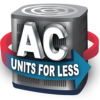The year 2024 is shaping up to be a pivotal year for the HVAC industry, with a strong emphasis on sustainability, efficiency, and smart technologies. Here are some key predictions and trends to watch out for:
1. Green Revolution:
- Heat Pump Surge: Driven by their eco-friendliness and efficiency, heat pumps are expected to continue their dominance, especially in warmer climates. Look for advancements in cold-climate heat pump technology to expand their reach.
- Focus on Renewables: Integration of renewable energy sources like solar panels with HVAC systems will gain traction, offering self-sufficient and environmentally friendly comfort solutions.
- Sustainable Refrigerants: The transition away from high-global warming potential (GWP) refrigerants will continue, driving innovation and adoption of more environmentally friendly alternatives.
2. Efficiency Reigns Supreme:
- High-Tech Efficiency: Expect advancements in variable refrigerant flow (VRF) systems, geothermal heat pumps, and smart controls to further optimize energy usage and minimize environmental impact.
- Building Regulations: Stringent building codes and regulations aiming for higher efficiency standards will likely drive the industry towards even more innovative and efficient solutions.
- Data-Driven Decisions: Increased use of sensors and data analytics will empower homeowners and businesses to monitor energy consumption and optimize system performance for maximum efficiency.
3. Smart Homes, Smarter Comfort:
- Integrated Systems: HVAC systems will increasingly integrate with smart home technology, allowing for seamless control, remote monitoring, and personalized comfort settings.
- AI-Powered Comfort: Artificial intelligence (AI) will play a bigger role in optimizing heating and cooling based on occupant preferences, weather patterns, and energy costs.
- Predictive Maintenance: Smart systems will predict potential issues and alert users for proactive maintenance, preventing breakdowns and ensuring optimal performance.
4. Indoor Air Quality Takes Center Stage:
- Focus on Health: Growing awareness of the link between indoor air quality and health will lead to increased demand for air purifiers, ventilation systems, and filtration technologies.
- Smart Air Quality Management: Integration of air quality sensors with HVAC systems will enable automatic adjustments to maintain healthy indoor air levels.
- Personalized Solutions: Advanced air quality monitoring and treatment systems will be tailored to individual needs and allergies, improving overall comfort and well-being.
5. Industry Shifts and Adaptations:
- Skilled Workforce Development: As technology advances, the industry will need to invest in training and education to equip technicians with the skills to service and maintain increasingly complex systems.
- New Business Models: Subscription-based services for maintenance and remote monitoring could become more prevalent, offering convenience and peace of mind to customers.
- Data Security and Privacy: With increased data collection and connectivity, cybersecurity measures will be crucial to ensure the protection of user data and system integrity.



